The AI and Employer Brand Showdown
1 hour





Resources > Reports & eBooks > Employer Branding
As the tech evolves and becomes more commonplace, we want it to help not hinder output and to amplify voices, not dull them. So, whether you’re wanting to increase AI use in your Employer Brand or you’re just starting out with it, this report will give you some thoughts and ideas on balancing it with authenticity.
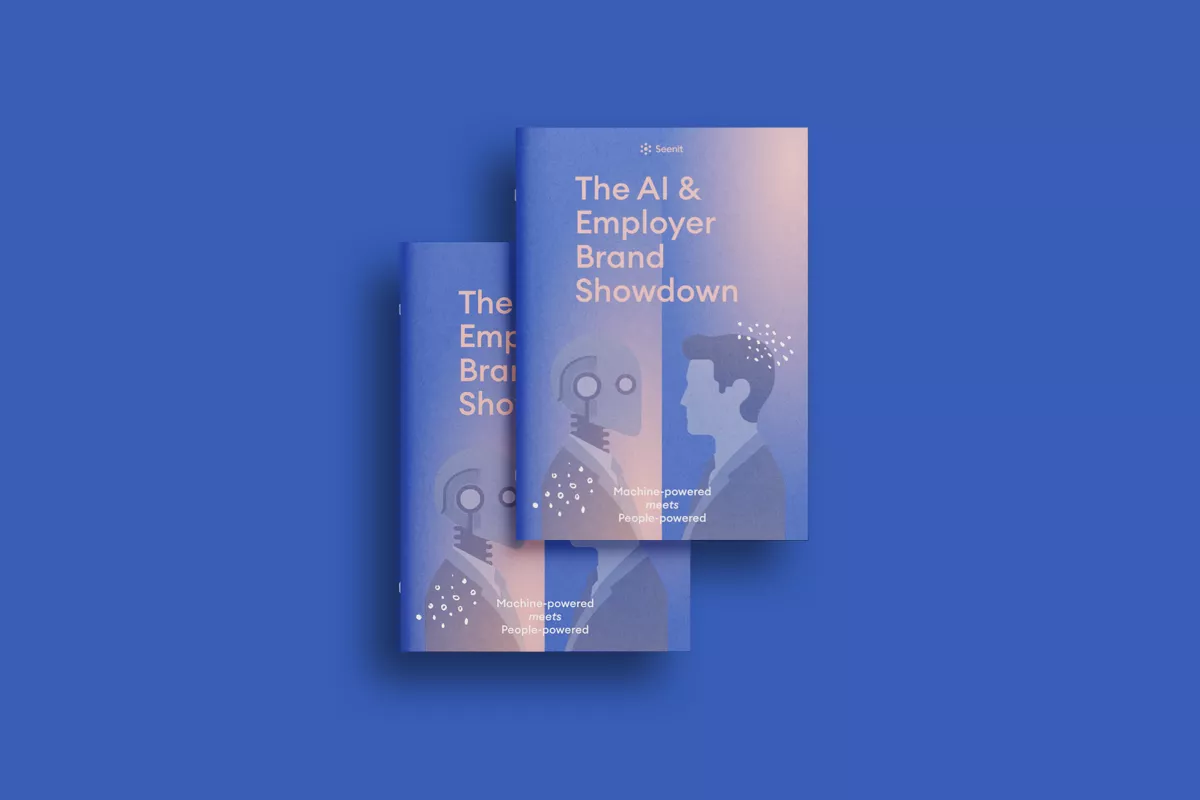
Brian Fink
Talent Acquisition Partner at McAfee
Chris Woods
Regional Recruitment Marketing and I&D lead at Mars
Dom Blossom
Senior Talent Partner at How Now
Emily Firth
Employer Brand Consultant at TheTruthWorks
James Ellis
Chief Brand Builder at Employer Brand Labs
Lizzie Barrett
VP Group Brand Strategy at Symphony Talent
Lizzy Knights-Ward
Founder & Consultant at KW Collective
Ryan White
Talent Acquisition Specialist & Employer Branding Lead at Danone
Timothy Schepis
Global Director Employer Brand at Coupang
Ian Merrington
Chief Technology Officer at Seenit
We are now firmly in the era of Artificial Intelligence (AI). Over the last year, websites like ChatGPT and Midjourney became a recurring talking point, whether with colleagues, on social media, and certainly around my table with friends and family. Within businesses too, AI is now used on nearly a daily basis as its abilities grow.
Of course, AI technology isn’t entirely new having been around as a concept since the inception of modern computing in the 1950s. The early 00s brought AI from the theoretical and academic world, with cloud providers such as Google and IBM bringing the power of AI to smaller businesses. But, the recent global AI boom, mainly fuelled by new Large Language Models (LLMs) such as ChatGPT and Google’s Bard have brought more awareness to what’s possible, regardless of what you want to do.
Lately, AI’s seemingly human-like help with ideation, content creation and mimicking other people’s styles have provided a resource to many teams when budgets are tight and workloads mount up. But with this, the question of AI’s impact on the workforce, and the copyright challenges of content produced using AI has been raised because of what AI tools are producing.
Other concerns around authenticity have been voiced, too. Fear of generic mass production, stereotyping, and the lack of nuance in storytelling – which is essentially, the loss of the human touch and emotional connection – are leading to new approaches on how AI can be used and deployed.
To help get a holistic view on authenticity and AI within Employer Brand, we’ve spoken to industry experts and thought leaders in the space. Our findings have been supported by our survey, bringing together knowledge, experiences and thoughts from more Employer Branding professionals.
As the tech evolves and becomes more commonplace, we want it to help not hinder output and to amplify voices, not dull them. So, whether you’re wanting to increase AI use in your Employer Brand or you’re just starting out with it, this report will give you some thoughts and ideas on balancing it with authenticity.
Ian Merrington, Chief Technology Officer, Seenit
Before diving into the wider discussion, it’s important to first know two things; the definition of AI and what types of AI are being referred to in this report.
Artificial Intelligence (AI) is a machine’s ability to perform the cognitive functions we associate with human minds, such as perceiving, reasoning, learning, interacting with an environment, problem-solving, and even exercising creativity.
AI now covers a multitude of capabilities, from predictive text and transcription to image creation and data analysis. In this report, we include all the above and anything else that falls under the AI umbrellas of machine learning, deep learning, and generative AI to give the most rounded and inclusive view of the technology.
It comes as no surprise that 65% of Employer Brand professionals have used AI in their role over the last year and that a huge variety of AI tools and websites were used to help them.
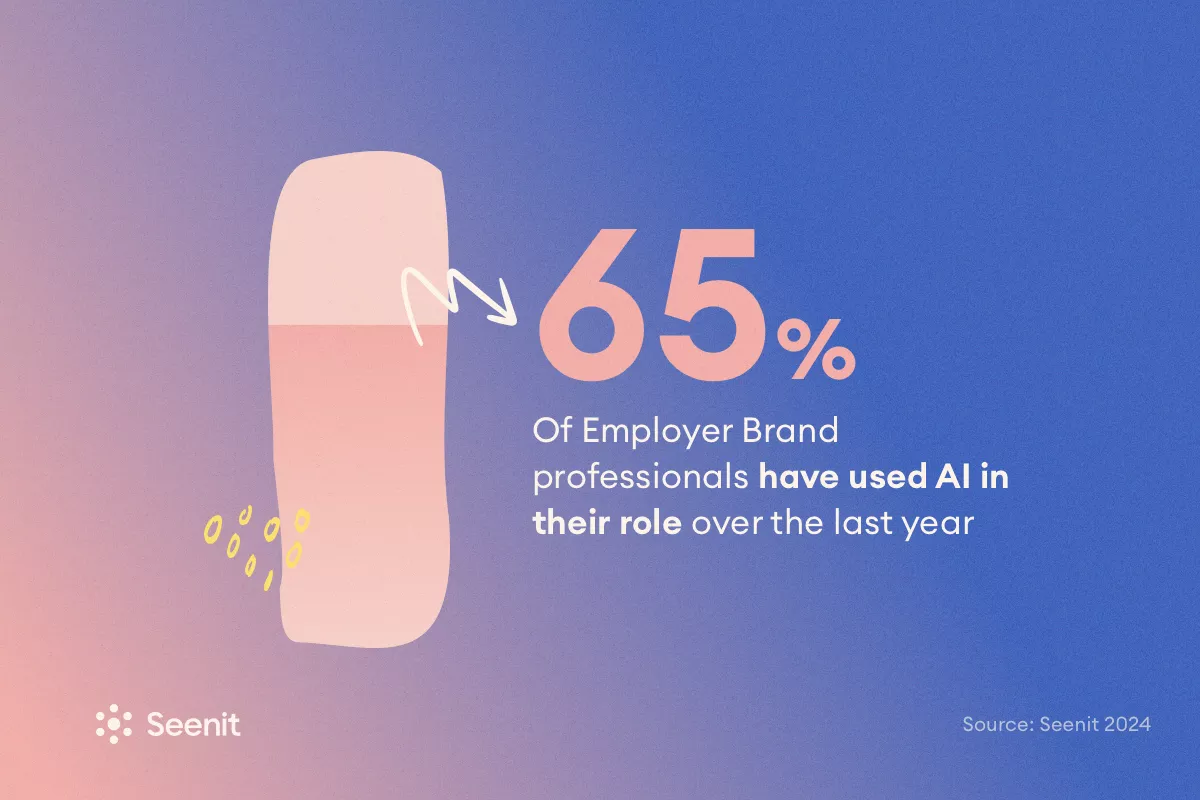
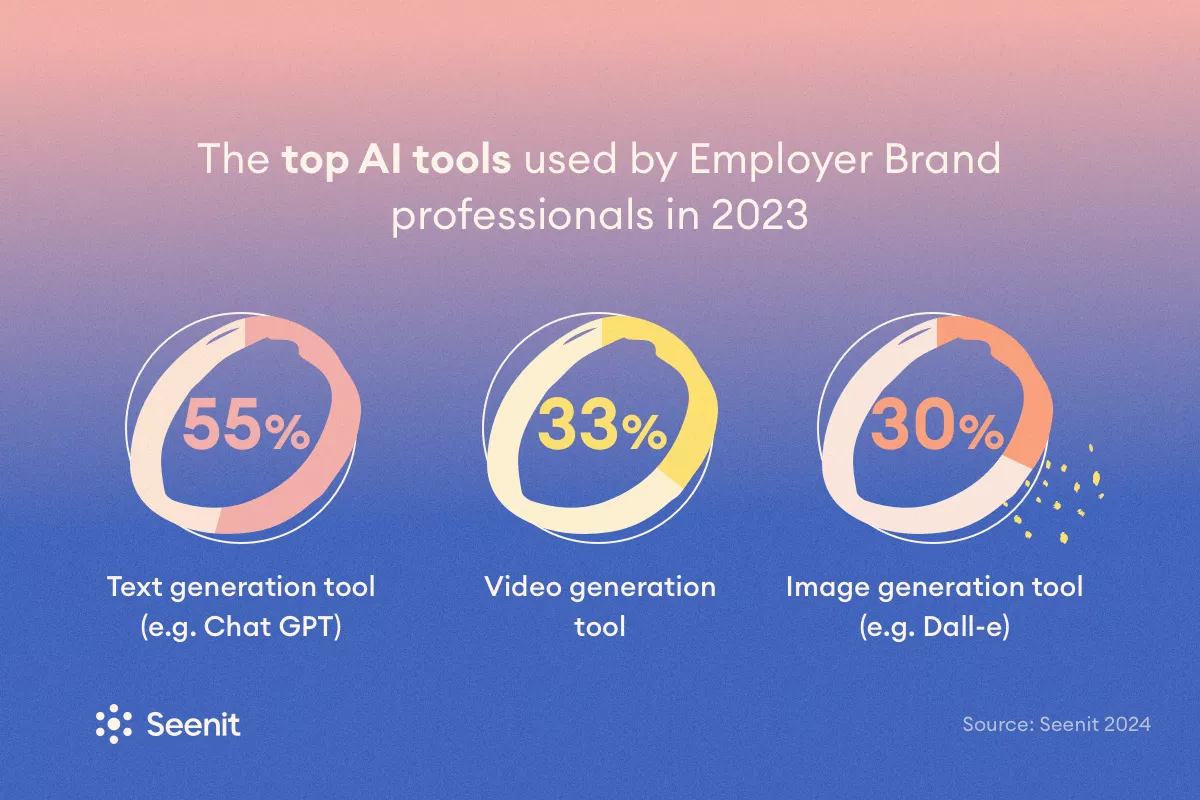
This shows that access to AI has become much easier with free-to-use websites widely available, with many backed by large tech companies and logos.
Our research found that 73% believe that AI tools have helped them save time, and 87% see improved productivity as a result. So, however it’s been used, AI has shown to free up time, allowing users to focus on the strategic elements that make a difference.
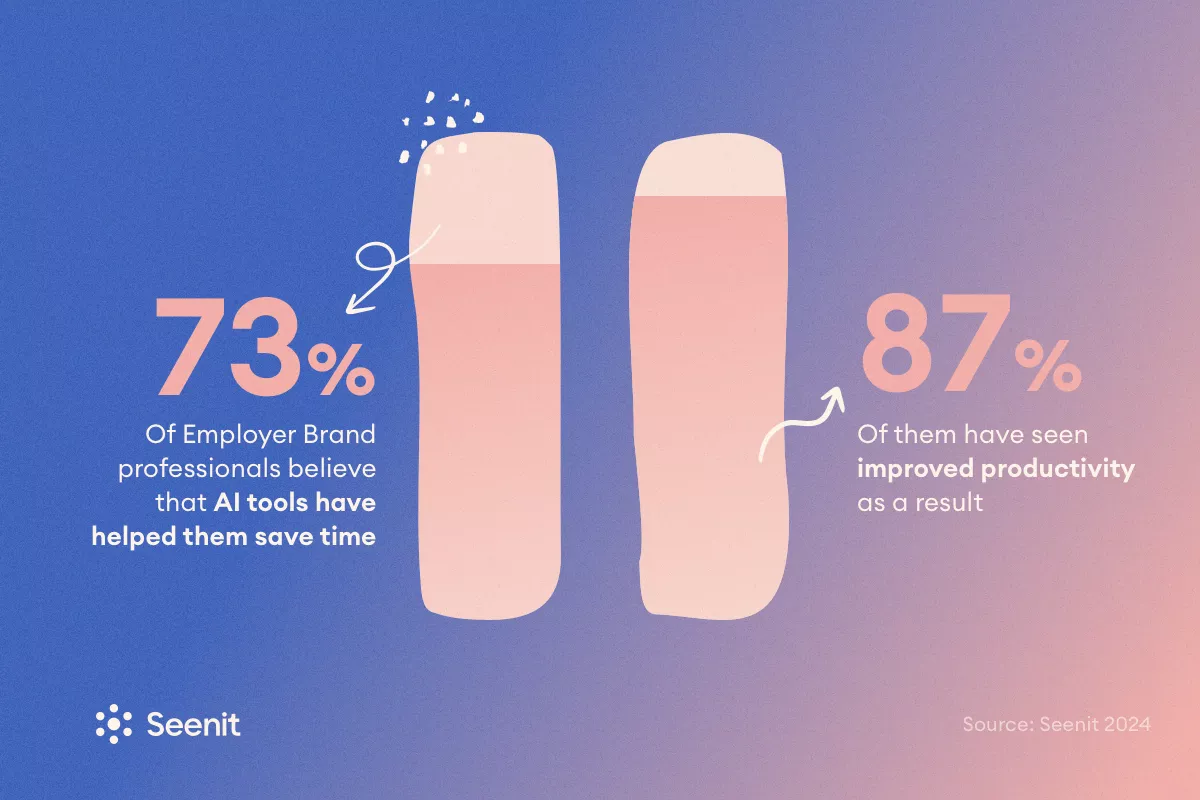
“AI helps to focus our attention.”
Lizzie Barrett, VP Group Brand Strategy, Symphony Talent
“It allows me to automate some of the time-consuming tasks that don’t need high levels of personalisation.”
Dom Blossom, Senior Talent Partner, How Now
“AI helps you get to the fun bit fast.”
Ian Merrington, Chief Technology Officer, Seenit
Often having to juggle being a recruiter, copywriter, designer, data analyst, marketer and coordinator all at once, an Employer Brand specialist needs to wear many hats and to have a full roster of skill sets to draw from.
So, with efficiency being at the heart of AI use, experts are seeing the tool as an extra resource for their team and in their role.
“It allows us to work smarter to activate and build strategies.”
Emily Firth, Employer Brand Consultant, TheTruthWorks
“We can enhance what we’ve already got.”
Ryan White, Talent Acquisition Specialist & Employer Branding Lead, Danone
When used as fully as possible, AI is primarily assisting Employer Brand teams throughout the recruitment life cycle. Our research showed that candidate searching came out on top as the biggest use case (48%), followed by further talent acquisition steps such as talent assessment (44%).
However, AI is helping many other key areas of Employer Brands too, including recruitment marketing, onboarding and employee engagement.
In addition, as AI – in its current state of popularity and understanding – is mainly viewed as a data input tool for speedy creative output, content creation was a recurrent theme. We found that 34% of Employer Brand professionals have used AI for content creation, while 21% use it for content personalisation.
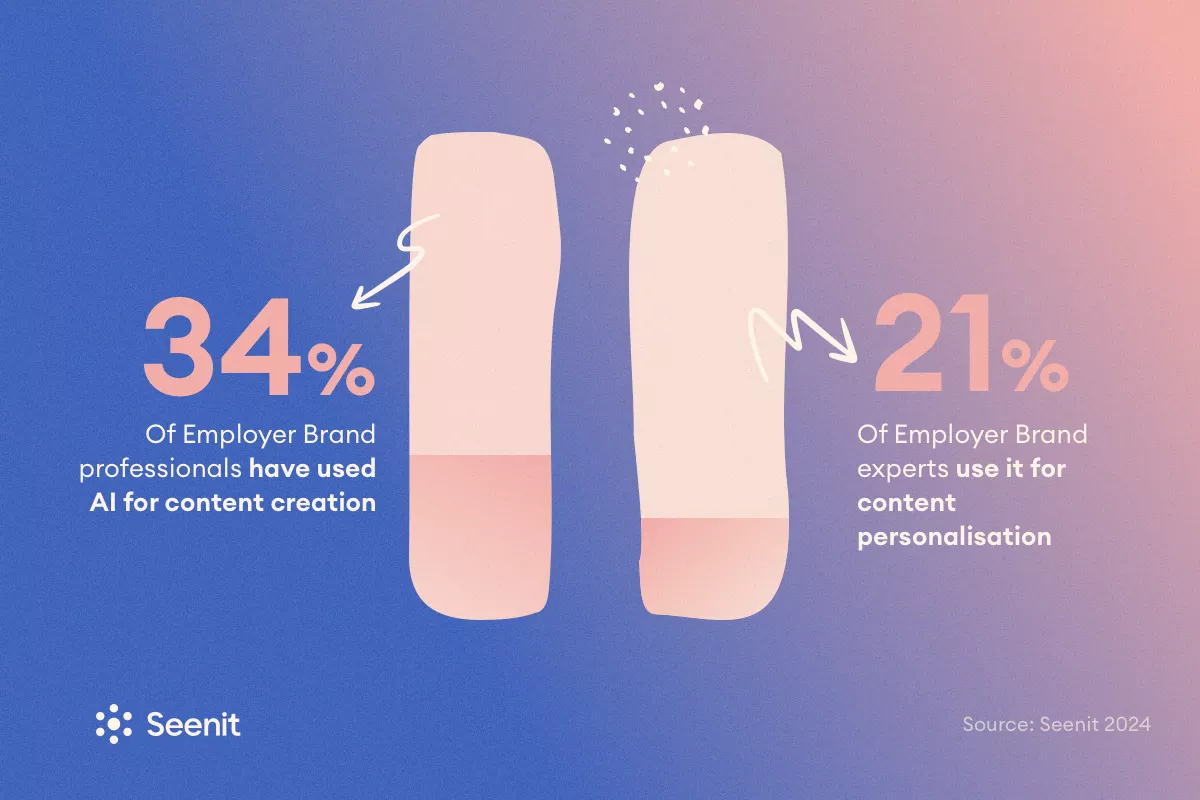
In a turbulent economy where hiring has slowed and there’s a higher expectation from businesses to look after their employees, more organisations are motivated to invest in their Employer Brand to reduce their costs in the longer term.
“There is an erosion of trust generally in society, and employers are one of the strongest trust relationships there is today.”
Emily Firth, Employer Brand Consultant, TheTruthWorks
In some instances, it’s only over the last year that companies have created their Employer Brand division and roles and are still learning and scoping out what it means for them.
Altogether, this drive has made the role of Employer Brand more far-reaching, away from simply recruitment or HR, as it becomes a greater priority for organisations and their bottom line.
So, with many areas to cover and targets to hit, our industry research has highlighted aspects of Employer Brand that professionals have found challenging and where AI has helped them.
For many Employer Brand consultants, data overwhelm isn’t uncommon and a necessary step to formulating a strong strategy for their clients. However, manually sifting through mountains of data to find the differentiator of the business is a gruelling process. With the introduction of AI though, this element can now be outsourced.
“I can find those minor gaps between competitors to really reinforce them. AI allows me to spend more time thinking and less time collecting, which is a good thing.”
James Ellis, Chief Brand Builder, Employer Brand Labs
For the recruitment side, AI is enabling more refined searches and personalised conversations with prospective candidates.
Attracting a higher calibre of talent and engaging them in a diversified experience from the outset can contribute to higher interest through the recruitment process. This has helped many to reduce time searching for candidates, and encouraged a different experience and strategy.
“We’ve used AI to support managers with better, more effective interview questions.”
Dom Blossom, Senior Talent Partner, How Now
“I can ask prospective candidates very specific questions about their published research papers, which means I’m better placed to find and talk with the best talent.”
Brian Fink, Talent Acquisition Partner, McAfee
Additionally, where interviews have traditionally been accompanied by avid note-taking, the use of transcription services has allowed recruiters to be more human and present in these conversations.
This not only better reflects the organisation but also allows interviewers a greater ability to assess if the candidate is a good fit.
“I can focus on the soft skills and their previous contributions, instead of the technical.”
Brian Fink, Talent Acquisition Partner, McAfee
In a content-saturated world, creating new, compelling pieces is proving difficult. For Employer Brand professionals without a marketing or design budget, the task of putting together content to both attract and retain best-in-class talent is time-consuming and often entirely new.
To counter this, various AI tools are the common desk buddy, helping to inspire and initiate ideas and to produce the content that will go out to market.
“Where I know my desired outcome and what I want to achieve, AI gives me ideas on how to get there. It’s helped me to feel more creative and comfortable creating my own content.”
Ryan White, Talent Acquisition Specialist & Employer Branding Lead, Danone
“I use it as a creative agency; condensing and changing lengthy pieces into short, attractive formats for different audiences.”
Chris Woods, Regional Recruitment Marketing and I&D lead, Mars
To help bolster Employer Brand messaging, video content is shown to be more engaging and valuable. AI is already assisting this with prompts for speakers to be less scripted and more natural, as well as rapidly speeding up the necessary post-production elements.
“I don’t want to be telling people what to say. I want to find the best way of using AI to enhance what people are naturally saying and what their own authentic self says.”
Ian Merrington, Chief Technology Officer, Seenit
Going further, video can often act as a launchpad for further content creation. Using AI, users can use what’s been said amongst many to create new articles, videos and posts more quickly.
While AI has made good headway and is already providing efficiency to many, there are still some gaps where Employer Brand processes could be improved.
Talent search and marketing efforts are the biggest areas in which AI is currently being used. Using AI’s ability to identify trends and opportunities, it could go further to build and execute strong custom campaigns backed by data.
“The AI calendar wasn’t able to pick up nuances on candidate data, so while the creation was quicker, it missed out on personalisation.”
Timothy Schepis, Global Director Employer Brand, Coupang
“To be able to create really good campaigns that reach the right people, at the right time, on the right platform would be so powerful.”
Chris Woods, Regional Recruitment Marketing and I&D lead, Mars
Another potential next step would be to use AI to measure the success of existing recruitment processes and retention efforts. These insights could contribute towards tangible Employer Brand improvement.
“By looking at how long someone stayed and how many promotions they received for example, we could gather whether it was a good fit for both the business and the employee, and review how that came to be.”
James Ellis, Chief Brand Builder, Employer Brand Labs
Additionally, where retention is a priority, AI could help internal messaging go further and employee experiences to be more seamless beyond their initial onboarding.
“After a big life transition, the return to work experience could be thought out by humans but made more structured, scalable and personalised by AI so it’s less dependent on a line manager’s time constraints.”
Lizzy Knights-Ward, Founder & Consultant, KW Collective
The topics of authenticity and AI seem to be at polar opposites, but our research show that many believe it’s possible that the two can exist together.
The majority of Employer Brand professionals (70%) believe it’s mostly possible to remain authentic when using AI, while only 12% believe it’s impossible.
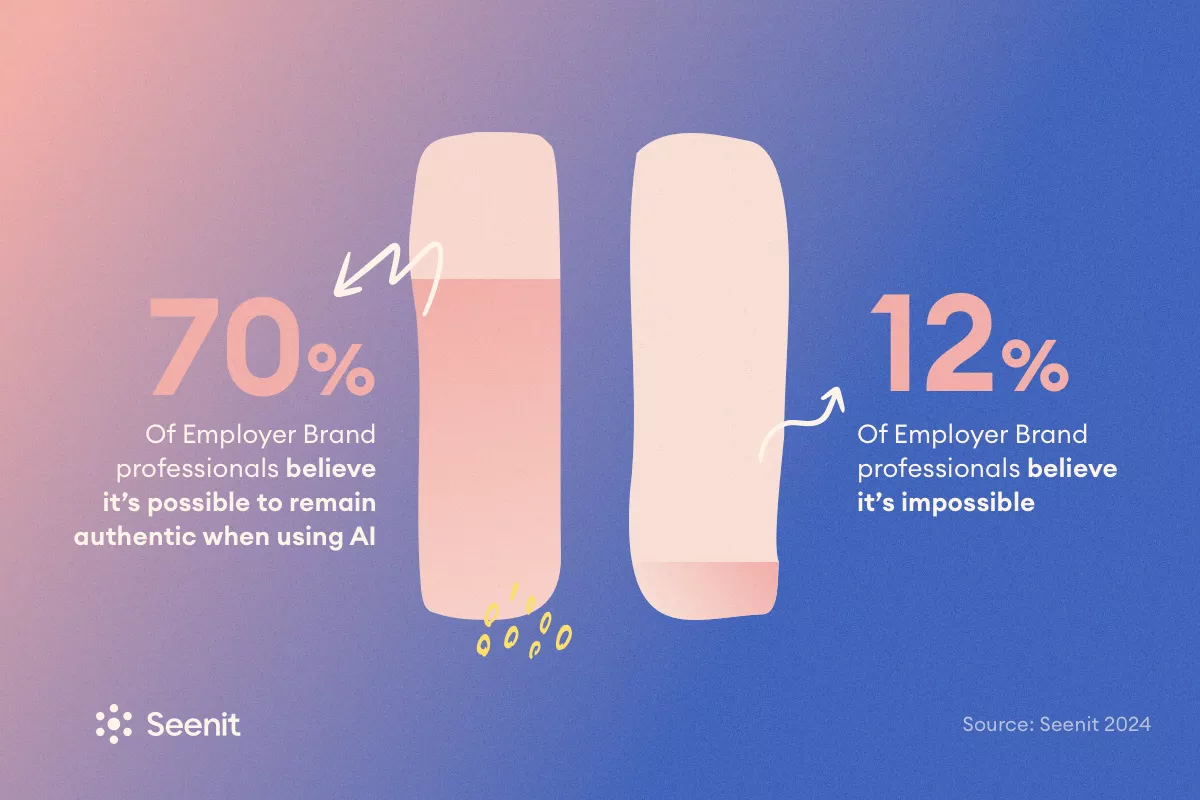
So what’s the big deal?
Where copyright and intellectual property are concerned, authenticity and AI don’t mix. However, within Employer Brand, authenticity is much more widely defined and stretches across the many elements of what’s considered human.
“The human messiness and the least polished stories.”
Emily Firth, Employer Brand Consultant, TheTruthWorks
“Real, empathetic, emotional connection.”
Lizzie Barrett, VP Group Brand Strategy, Symphony Talent
“A lived experience by a human.”
Chris Woods, Regional Recruitment Marketing and I&D lead, Mars
The idea that robots are going to take over the world has quieted down as we’ve seen AI’s limitations when it comes to sentiment, emotion and communicating real-world experiences. But for the world of Employer Brand which is steeped in people stories and a need for connection, the concern of remaining authentic when using AI is a real one.
While many believe it’s possible to remain authentic with AI, our survey found that the majority are either very concerned (38%) or somewhat concerned (34%) that an over-reliance on AI would diminish the human touch in Employer Branding.
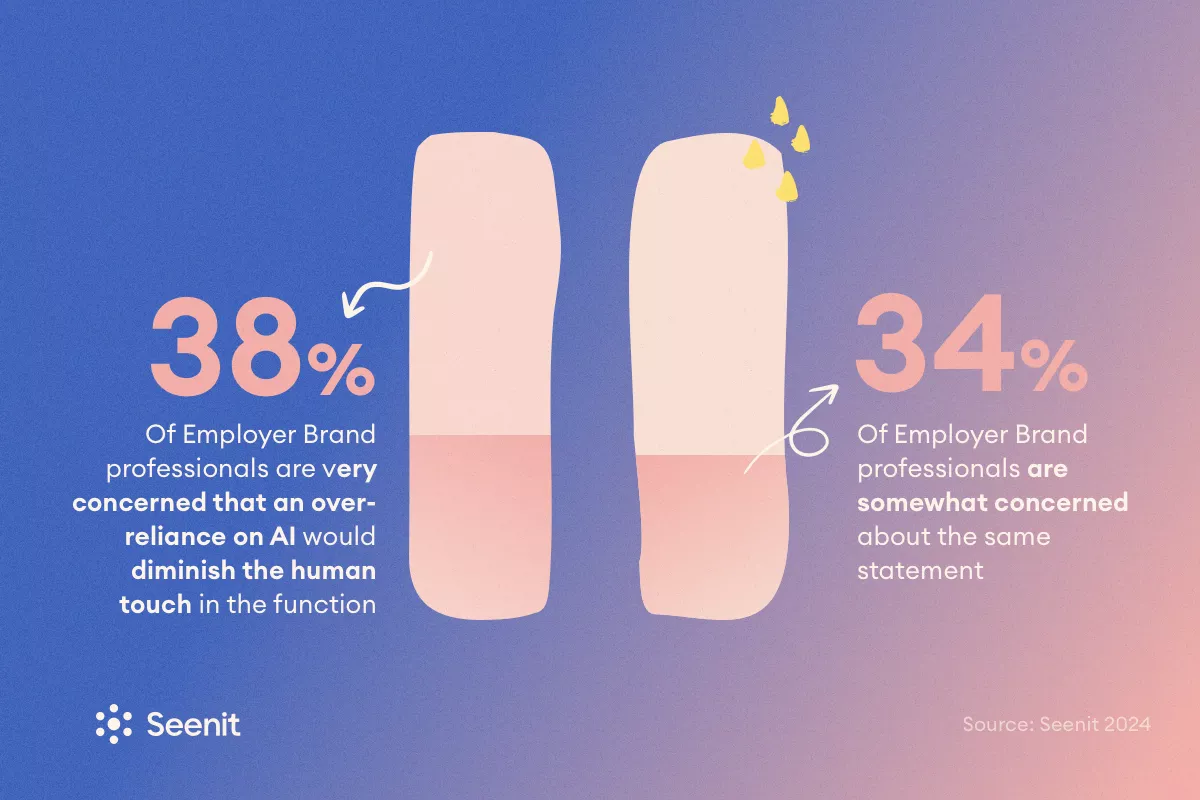
As AI relies on the data it’s fed, and many Employer Brand professionals are multi-tasking strategy, content and hiring, is it too easy to slip into more AI-generated results?
Where editing and refinement can go so far that it no longer resembles the original or that what is being produced doesn’t replicate anything a human could have experienced or built, we need to look at what guardrails would help to avoid this.
Employer Brand requires authentic people-powered stories from all parties involved; the business, the employee, and the candidate. The ability to maintain a high level of humanity enables organisations to get the most from their teams and to attract the best talent that also fits with the company’s ethos and values.
The goal for most Employer Brand specialists then is to create a business environment for individuals to be their happiest, most supported selves from the beginning. In turn, these individuals have the opportunity to reach their full potential during their interview and within their role once they’re placed.
“People perform better when they have a level of emotional and sociological safety surrounding them.”
James Ellis, Chief Brand Builder, Employer Brand Labs
But how can AI and authenticity come together successfully?
When creativity can feel stunted, AI can provide the prompts (sometimes literally) to help get people started. Instead of using AI for the final output, it can get the juices flowing so individuality and creativity can come through more naturally.
For example, Seenit’s prompts and tips help users to feel more guided and natural in front of the camera.
“It can help spark ideas. I don’t want AI to do the creative part but to make it easier.”
Ian Merrington, Chief Technology Officer, Seenit
Even when asking AI to create, it still demands that the human has the idea to kick start the project, and it’s up to them to review the finished piece for final checks and balances before publication.
“Your story is only as good as the brief you’re given. Humans are needed for good, specific prompts.”
Emily Firth, Employer Brand Consultant, TheTruthWorks
“You’ve got to ask, does it look like us? Our brand identity, purpose, mission, and core principles?”
Chris Woods, Regional Recruitment Marketing and I&D lead, Mars
As mentioned earlier, one of AI’s strengths is its ability to mine through data to identify patterns. What it can’t do currently is bring these trends together to build a compelling Employer Brand strategy with emotion and lateral thinking at its core. That’s something only humans can do and where we have to come in.
“It can alleviate a lot of stress and filtering, giving us some impetus and the ideas.”
Lizzie Barrett, VP Group Brand Strategy, Symphony Talent
AI can also help to bring a new lease of life to old content. By looking through previous Employer Brand documents and content with a central theme in mind, AI is able to find those that match so users can create something entirely new and more human.
“You don’t have to go through two hundred videos. AI finds what you want and can make it more impactful.”
Ian Merrington, Chief Technology Officer, Seenit
For translation services, AI is better at taking into account language structure and grammar. So far, it’s proving far more effective and accurate than the default online searches that often don’t make sense.
For global businesses then, AI tools are improving their local presence. Using the original text pre-approved by a human, AI is encouraging a better connection and reaching more people through localisation.
“It can help to shape and tell your story in ways that reach your audience more authentically.”
Lizzie Barrett, VP Group Brand Strategy, Symphony Talent
Honesty is needed to drive and maintain the connection between employees and candidates and the organisation in question.
For some, authenticity is mentioning where AI has been used to show openness and to build trust. While others believe that content shouldn’t be too slick or perfected to invite more human connection and buy-in.
“We don’t want to polish out all the rough edges to the point we don’t see the mistakes and the humanity we’ve captured.”
Emily Firth, Employer Brand Consultant, TheTruthWorks
While for some in Employer Brand, remaining authentic when AI is involved is possible with strategic use, for others they don’t believe this is the case.
“When AI and Employer Brand mix, things will get watered down. To be authentic you need to dive deep in explaining its use for each use case and in large businesses with multiple work streams, this isn’t possible.”
Lizzy Knights-Ward, Founder & Consultant, KW Collective
Looking further into the future and how AI will be embraced, the possibility that it being so ubiquitous may change the approach to people-powered stories all together.
“We could get to a stage where candidates may accept an AI-generated story and no longer expect or need an all-out people-powered one.”
Timothy Schepis, Global Director Employer Brand, Coupang
Employer Brand experts agree that AI is something to be embraced in their role, particularly as resources are low and demands and expectations stay high.
However, people trust people and the human input remains a key pillar to building strong relationships.
With this in mind, the use of AI within Employer Brand requires a thoughtful and grounded strategy in order to remain authentic. There’s already growing recognition of this shown through the hybrid approach many are taking whenever AI is involved.
“They’re time savers but they still need to be reviewed and approved by humans.”
Timothy Schepis, Global Director Employer Brand, Coupang
To help ensure the balance, some top priorities for 2024 for Employer Brand professionals have included pairing AI with the human touch and bringing in young talent versed in AI.
“If you’ve got a group of people taking the time to build a model rooted in personality and value, it can help mitigate authenticity risk.”
Lizzy Knights-Ward, Founder & Consultant, KW Collective
The key is to remain considered with its use and to not outsource entire projects to it because it’s human input that makes AI powerful.
Curious about how to balance AI and Employer Brand? Tune in to our webinar on March 13th at 4pm to see if a world can really exist where Machine-powered meets People-powered.
“AI should support you telling a human story, not replace it.”
Emily Firth, Employer Brand Consultant, TheTruthWorks
Ultimately, when it comes to balancing authenticity and AI, two key elements need to stay at the forefront for Employer Brand:
“We are selling a dream, a life, a career to people.”
Chris Woods, Regional Recruitment Marketing and I&D lead, Mars
“Are we keeping the promise we made?”
James Ellis, Chief Brand Builder, Employer Brand Labs
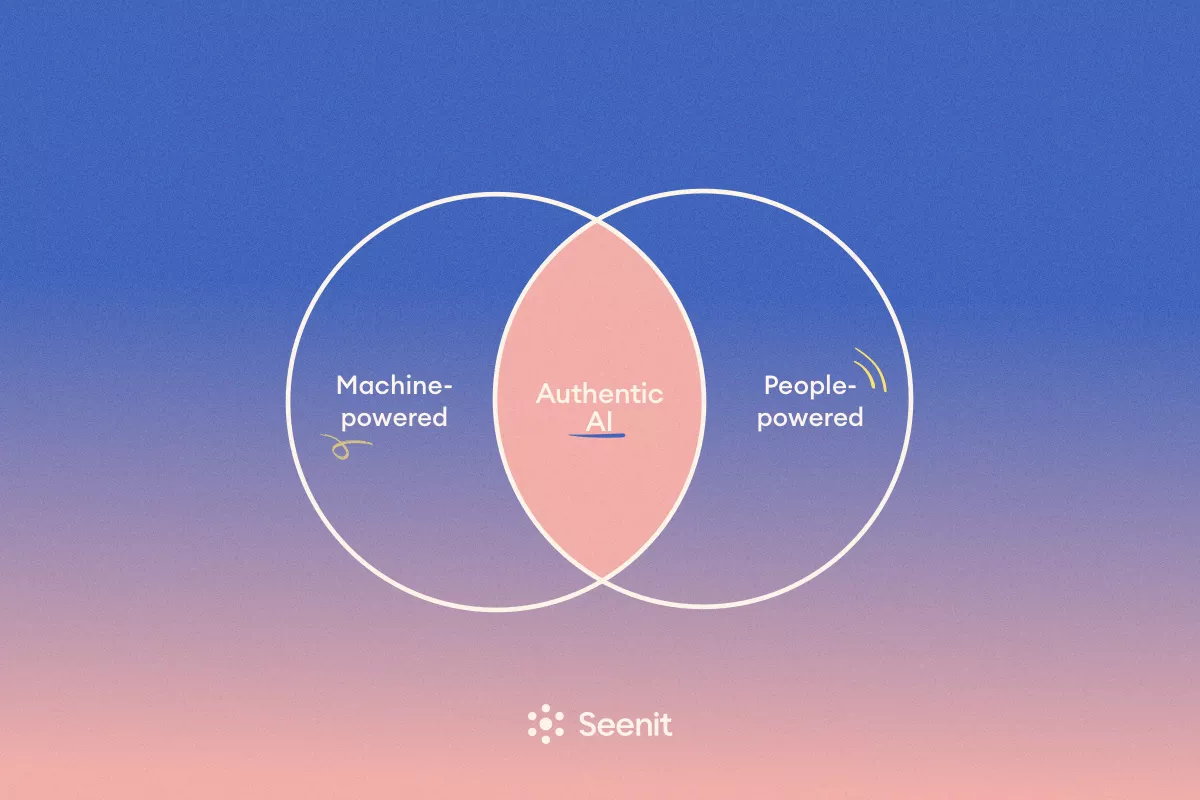
AI, in any of its iterations, has become a staple for businesses of all sizes and is proving incredibly helpful for Employer Brand professionals. Whether it’s providing quick data analysis and aggregation, initiating content production or simply freeing up a hand during interviews, AI is providing a new level of practical efficiency.
Where these professionals are required to multi-task across multiple job functions under the name of Employer Brand, this is a much needed (and smart) tool to be used to their advantage.
However, authenticity will inevitably enter the AI discussion because of what lies at the core of Employer Brand: people.
Hearteningly, there seems to be a collective understanding of three key elements:
By using this knowledge and building a strategy around it, authenticity remains central to Employer Brand even when AI is involved. It can help better it, in fact, because the arduous and mechanical are completed allowing humans to enter creativity and build connection.
Lastly, and most importantly, Employer Brand professionals do not want to see humans being replaced by AI in any way. Their prioritisation and deep understanding of the impact of the human touch means it’s not at risk of being lost, even as AI capabilities grow.
Unlock employee-powered video to increase your engagement across your Employer Brand.
Did you know 88% of applicants rate culture as a deciding factor in choosing a job? People trust people, so put a face to your messages and empower your team to contribute, create & share on-brand employee video. And that’s where we can help. Seenit gives your team everything they need to create videos with your employees.
Create, share & measure engaging content to enhance your Employer Brand and Communications, no experience needed, with the employee-powered video platform. Leading Employer Brand and Communications people at companies like Amazon, H&M and Vodafone use Seenit to empower their teams and get measurable results.
Search seenit.io to find out more.









